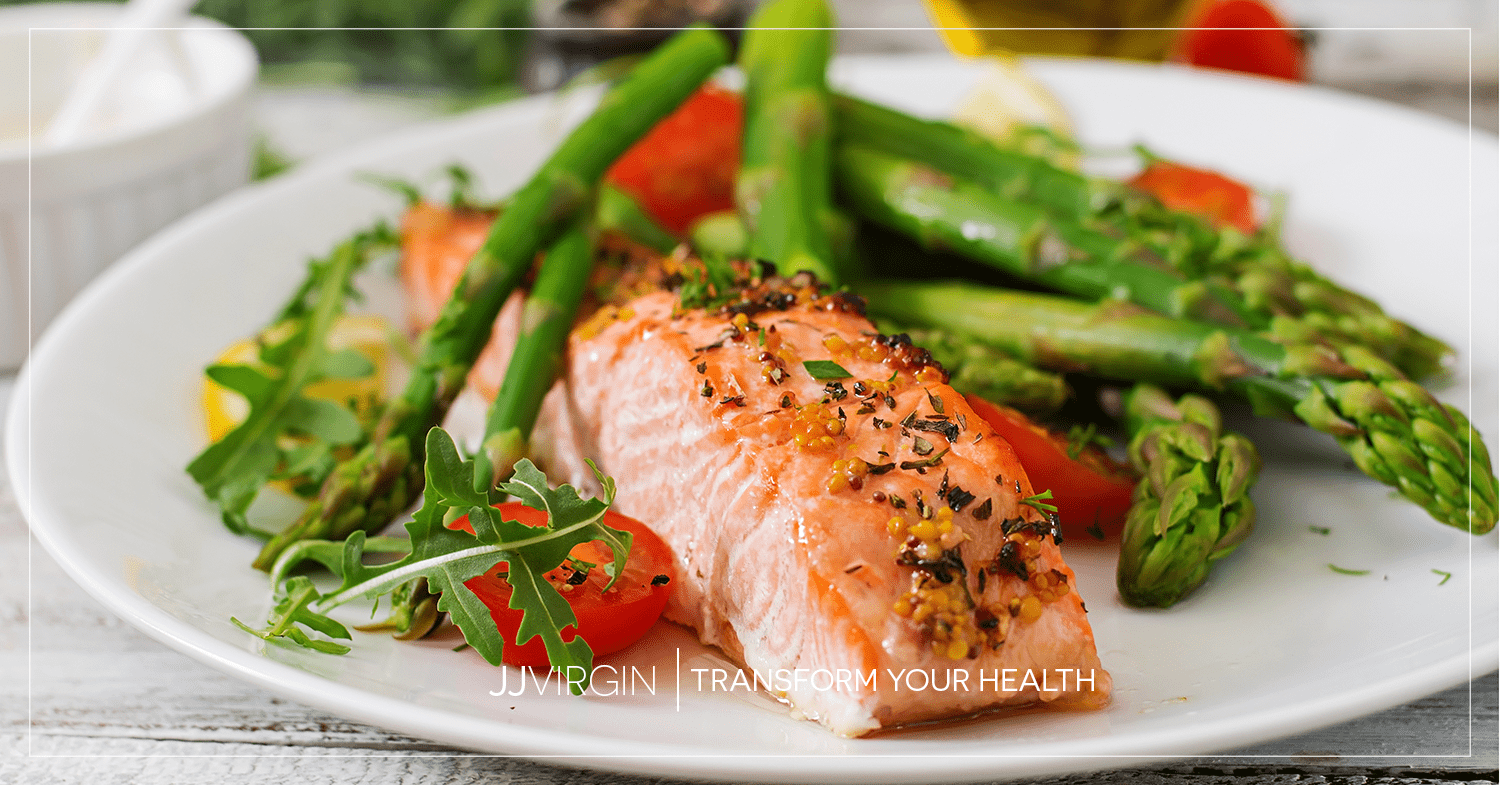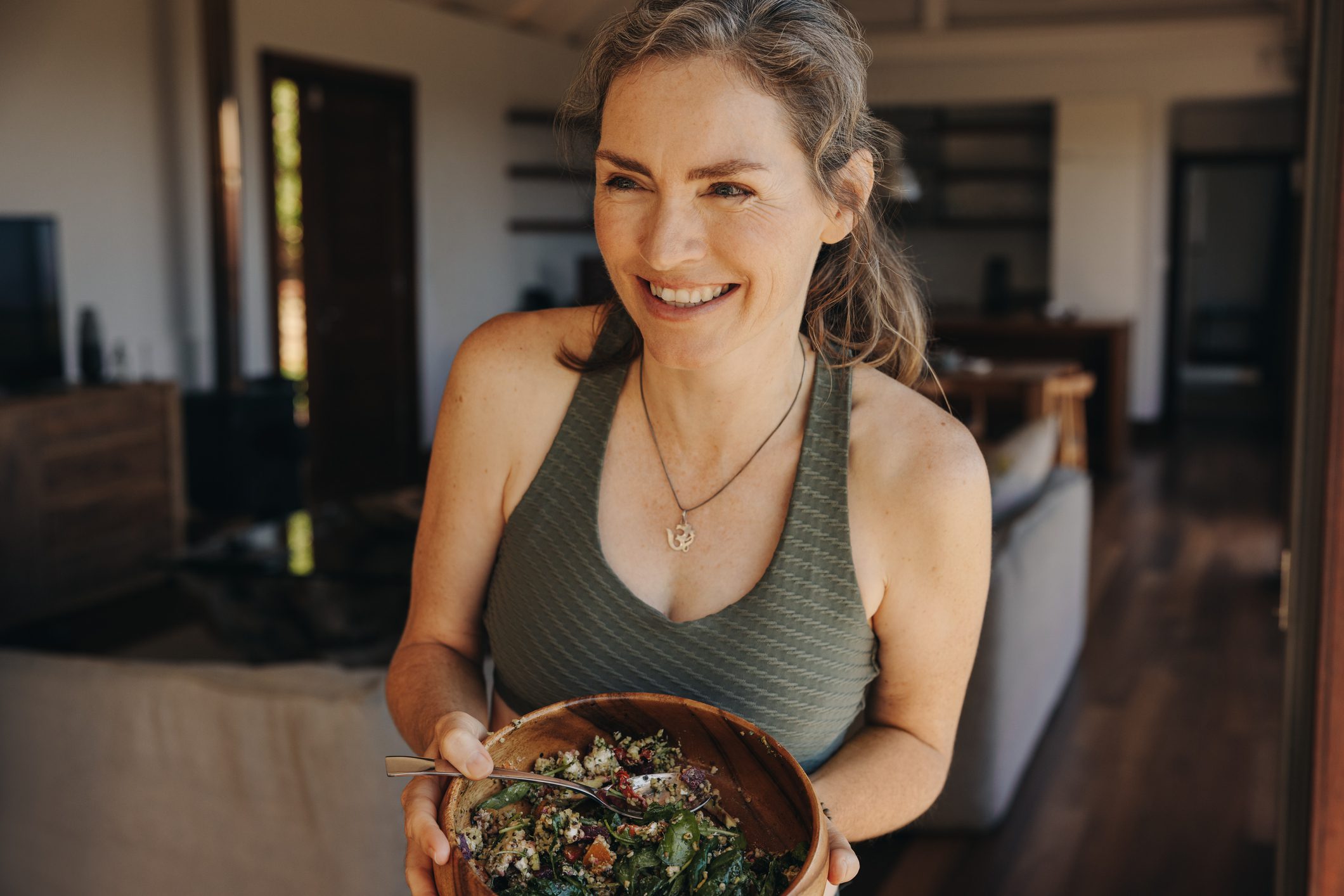Protein is a powerful nutrient that fuels your body in so many ways, and clean, lean protein should be a part of every meal.
A protein-first approach is the best way to balance blood sugar, optimize your metabolism, and meet your body-composition goals.
Why Protein Is So Important
According to the protein-leverage hypothesis, your body has a natural instinct to eat until you get enough protein. This suggests that even if you eat a lot of food that has a lot of calories (but not enough protein), your body will still want more food because it’s looking for the protein it needs to function properly.
Essentially, when your protein intake is too low, you’re hungrier, you overeat, and you over-consume fat and carbohydrates—all in an attempt to meet those protein needs.1
That makes sense when you consider the many necessary roles that protein plays in the body, such as providing fuel for energy. Your body breaks down protein into amino acids that provide numerous benefits, including:
- Helping you feel fuller longer, curbing hunger and cravings
- Repairing, building, and maintaining muscle
- Keeping your bones strong and supple
- Boosting metabolism and increasing fat burning
- Helping your body repair and recover
- Supporting immune function, helping to fight infection and inflammation
- Providing the building blocks for hormones and neurotransmitters
- Keeping you fit as you get older2
If you’re trying to lose fat, protein should be top priority. Why? Because protein is a high-thermic food, meaning it takes more calories to break down and utilize in the body than dietary fat or carbohydrates. As a result, you burn more calories.3
I’m a firm believer in getting most of your protein from animal sources. Animal protein (including red meat) is more nutritious, has a higher-quality amino-acid profile, and, ounce for ounce, is more bioavailable, allowing you to more easily meet your needs.
How Much Protein Do You Need?
Probably more than you think.
While your protein requirement isn’t static, I generally recommend eating 0.7 to 1 gram of protein per pound of your ideal body weight.
- 0.7 grams of protein per pound of ideal body weight is the minimum for healthy folks and those who want to maintain a healthy weight.
- 1 gram of protein per pound of ideal body weight if you’re vegan, aging, training really hard, or you’re recovering from illness, injury, or surgery.

Need a few ideas on how to reach your daily intake? Read this blog on how to get 100+ grams of protein per day.
Prioritize Protein at Breakfast
While I recommend getting at least 30 grams of protein in every meal, optimal protein intake is especially important to focus on in your first meal of the day. Studies show that a healthy breakfast supports improved nutrient intake, better overall food choices throughout your day, stronger heart and brain health, and a healthy weight.5
When you wake up in the morning, your body craves protein. Unlike carbohydrates or fat, you can’t store protein in the body to use when intake is low. Without enough of this macronutrient in your diet, your body will start breaking down muscle tissue in a desperate attempt to meet its protein needs (essentially consuming itself).6
The solution? Start every day with a high-protein breakfast. Starting your day with optimal protein helps meet your body’s demands while reducing hunger and cravings, stabilizing your blood sugar, revving up your metabolism, and helping you stay energized and focused for hours.
Breaking your morning fast with a loaded smoothie is the easiest, most effective way to meet your protein needs.
I’ve got over 60 protein-packed recipes in my FREE Loaded Smoothie Cookbook to make meeting your protein needs a cinch… at breakfast or ANY time of the day.
How to Choose the Best Protein Sources
It’s important to be aware that not all protein is created equal. How your protein is raised matters.
Studies show that protein from plants or animals exposed to hormones, antibiotics, or pesticides can be harmful to humans.7-9 But that’s not the only way your protein can be compromised.
Eating meat, dairy, and eggs from animals kept in unclean factory-farm conditions and fed a diet of GMO corn and soy means that you’re taking part in those meals, too.
In fact, eating eggs from soy-fed chickens or beef raised on corn has caused food sensitivities to flare up in some of my clients, even when other sources of the top seven highly-reactive foods have been eliminated from their diet.
Plus, research proves that feeding animals corn, soy and other grains changes their fatty-acid profile, which means their meat, milk, and eggs are more likely to cause inflammation.10–12 That’s why I always say, “You are what you eat ate!”
Here are a few resources to help you make healthier decisions when shopping for protein:
- How to Read Labels for Healthier Choices
- My Guide to Protein Powders
- Reignite Wellness™ All-In-One Shakes
Protein Needs as You Age
As you get older, you can progressively lose muscle mass, strength, and function—a condition called sarcopenia. Your muscles can also become less sensitive to the effects of protein and exercise (known as anabolic resistance). This makes building and maintaining muscle mass more difficult.
Research shows that older adults may require higher amounts of protein to maintain muscle mass and function. Getting optimal protein intake in your 50s, 60s, 70s, and beyond can improve physical function, prevent sarcopenia and muscle loss, support strong bones and muscle, help you manage hunger, and help you find your ideal body composition.13
Are You Digesting Your Protein Well?
Getting optimal amounts of protein is only half the challenge. Digesting that protein is equally important. As you get older, your body must work harder to break down protein, starting around age 30. Your pancreas may start to have less ability to produce the enzymes to effectively break down protein.14
Your stomach also produces hydrochloric acid (HCl), more commonly called stomach acid, to break down protein. As you age, your body isn’t always making enough HCl.15 The end result of those decreased enzymes and HCl is that your body can’t adequately digest and absorb protein. This becomes apparent when you increase your protein intake and start to notice more gas and bloating—it’s a good indication you need some help processing it all.
The answer is taking a full-spectrum digestive enzyme before your meals.
A well-designed, comprehensive digestive-enzyme formula should supply ingredients like:
- Amylases, proteases, and lipases: enzymes that break down carbohydrates, proteins, and fats, respectively
- Betaine HCl, a source of hydrochloric acid (HCl) that helps break down protein in your stomach
- Ox bile extract, which helps excrete harmful substances and eliminates excess cholesterol
- Additional digestive enzymes that break down problematic foods such as gluten, casein, soy, and lactose
A comprehensive digestive enzyme can support nutrient breakdown and absorption. We’ve combined digestive enzymes, betaine hydrochloride (HCI), and select botanicals in Protein First Enzymes to help promote the efficient digestion of proteins, fats, and carbohydrates like a pro!*
References:
- Raubenheimer D, Simpson SJ. Protein Leverage: Theoretical Foundations and Ten Points of Clarification. Obesity (Silver Spring). 2019 Aug;27(8):1225-1238. doi: 10.1002/oby.22531. PMID: 31339001.
- Healthline: 10 Science-Backed Reasons to Eat More Protein
- Pesta DH, Samuel VT. A high-protein diet for reducing body fat: mechanisms and possible caveats. Nutr Metab (Lond). 2014 Nov 19;11(1):53. doi: 10.1186/1743-7075-11-53. PMID: 25489333; PMCID: PMC4258944.
- López-Sobaler AMª, Cuadrado-Soto E, Peral-Suárez Á, Aparicio A, Ortega RMª. Importancia del desayuno en la mejora nutricional y sanitaria de la población [Importance of breakfast in the nutritional and health improvement of the population]. Nutr Hosp. 2018 Sep 7;35(Spec No6):3-6. Spanish. doi: 10.20960/nh.2278. PMID: 30351152.
- Baum JI, Kim IY, Wolfe RR. Protein Consumption and the Elderly: What Is the Optimal Level of Intake? Nutrients. 2016 Jun 8;8(6):359. doi: 10.3390/nu8060359. PMID: 27338461; PMCID: PMC4924200.
- UCLA Health: Are you getting enough protein? Here’s what happens if you don’t
- Jeong SH, Kang D, Lim MW, Kang CS, Sung HJ. Risk assessment of growth hormones and antimicrobial residues in meat. Toxicol Res. 2010 Dec;26(4):301-13. doi: 10.5487/TR.2010.26.4.301. PMID: 24278538; PMCID: PMC3834504.
- Lu, C., Toepel, K., Irish, R., Fenske, R. A., Barr, D. B., & Bravo, R. (2006). Organic diets significantly lower children’s dietary exposure to organophosphorus pesticides. Environmental health perspectives, 114(2), 260–263. https://doi.org/10.1289/ehp.8418
- Environmental Working Group: Dirty Dozen
- Fritsche, K. L., Cassity, N. A., & Huang, S. C. (1991). Effect of dietary fats on the fatty acid compositions of serum and immune tissues in chickens. Poultry science, 70(5), 1213–1222. https://doi.org/10.3382/ps.0701213
- Daley, C.A., Abbott, A., Doyle, P.S. et al. A review of fatty acid profiles and antioxidant content in grass-fed and grain-fed beef. Nutr J 9, 10 (2010). https://doi.org/10.1186/1475-2891-9-10
- Hebeisen, D. F., Hoeflin, F., Reusch, H. P., Junker, E., & Lauterburg, B. H. (1993). Increased concentrations of omega-3 fatty acids in milk and platelet rich plasma of grass-fed cows. International journal for vitamin and nutrition research. Internationale Zeitschrift fur Vitamin- und Ernahrungsforschung. Journal international de vitaminologie et de nutrition, 63(3), 229–233.
- UNM Newsroom: The benefits of eating more protein as we age
- Löhr JM, Panic N, Vujasinovic M, Verbeke CS. The ageing pancreas: a systematic review of the evidence and analysis of the consequences. J Intern Med. 2018 May;283(5):446-460. doi: 10.1111/joim.12745. Epub 2018 Mar 23. PMID: 29474746.
- Healthline: Hypochlorhydria (Low Stomach Acid)
*These statements have not been evaluated by the Food & Drug Administration. Products mentioned are not intended to diagnose, treat, cure, or prevent any disease. The views in this blog by JJ Virgin should never be used as a substitute for professional medical advice. Please work with a healthcare practitioner concerning any medical problem or concern.






